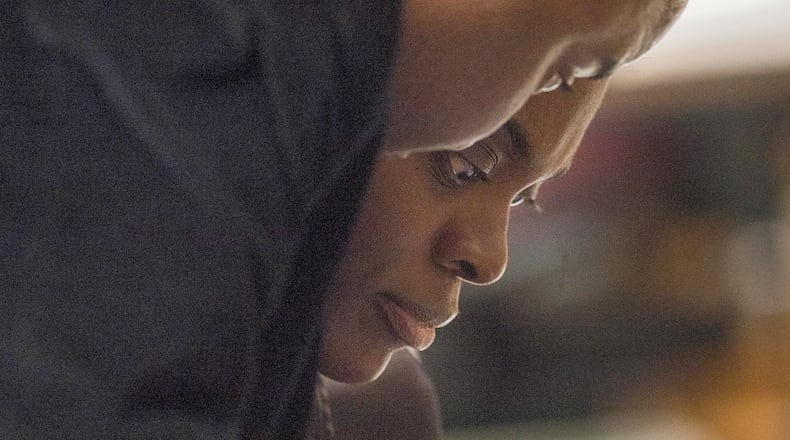A Gwinnett County woman on Monday became the second person in decades to face a death-penalty trial in Georgia acting as her own attorney.
Jury selection got underway with Tiffany Moss asking a few questions to prospective jurors. Moss is accused of starving her 10-year-old stepdaughter, Emani, to death in 2013.
On Monday, the 35-year-old sat alone at the defense table. She occasionally took notes with pens and a legal pad brought into court for her by District Attorney Danny Porter. She thumbed through questionnaires filled out by potential jurors.
And for the first time in months, Moss spoke to the state capital defenders who'd been initially assigned to represent her. Moss has steadfastly refused their representation, saying she's putting her fate in God's hands. But twice on Monday, she asked the defenders to confer with her.
Superior Court Judge George Hutchinson had appointed the defenders, Brad Gardner and Emily Gilbert, as “standby counsel.” They sit behind Moss in the courtroom gallery ready to assist her if she asks for help.
Credit: Alyssa Pointer
Credit: Alyssa Pointer
Throughout the day, Hutchinson brought jurors into the courtroom one by one for individual questioning. They were asked for their views on capital punishment and whether they could consider all three sentencing options if Moss is convicted of murder: the death penalty, life in prison without the possibility or parole and life with the possibility of parole.
When they asked questions, Porter and Assistant District Attorney Lisa Jones let jurors know that Moss has a constitutional right to represent herself and that she’s exercised that right.
“It’s pretty brave,” Juror No. 4 replied, when asked by Porter what he thought about that.
That prospective juror, a former U.S. Navy nuclear engineer who now works for Kroger, said he wouldn’t hold that against Moss.
After Porter finished, Moss reminded the man that he’d said his wife had talked to him about her case before he’d received his jury summons.
If your wife thought I was guilty, Moss asked, would that affect your ability to be fair and impartial?
No, the man answered, adding, “My wife is over-opinionated.”
Juror No. 6, however, said she wasn’t sure how Moss’s decision to represent herself would affect her thinking.
“Well, if you’re defending yourself you’ve got a certain confidence,” said the woman, a massage therapist. “… I would think if you’re confident enough to do that now, why could you not have stopped the death of someone before?”
Credit: Alyssa Pointer
Credit: Alyssa Pointer
Moss later reminded Juror No. 11 that her case has a “child victim.” Could you remain fair and impartial when “there may be some disturbing evidence?” she asked. Juror No. 11 said she could. Moss remained soft spoken and polite throughout the questioning.
But Moss appeared to stumble badly after Juror No. 15 repeatedly said she could not vote for a life-with-parole sentence for someone found guilty of killing a child.
“It’s hard to imagine a guilty party being out (of prison) having been found guilty (of killing a child) beyond a reasonable doubt,” Juror No. 15, a surgical nurse, said, under questioning by Jones.
When it was her turn, Moss asked the juror if she still felt life with parole would not be an option for her if she had to decide punishment.
“I would consider everything,” Juror No. 15 said, giving the prosecution the answer it needed. (Jurors who say they cannot consider life with parole as a sentencing option can be struck on impartiality grounds.)
Jones told Hutchinson the prosecution was not going to excuse Juror No. 15 and Moss only compounded the situation, telling the judge she had no objection. He raised his eyebrows, then moved on to the next juror.
The last time a death-penalty defendant represented himself occurred in 2015. Jamie Hood served as his own lawyer, accused of the murder of an Athens-Clarke County police officer, the attempted murder of another and other offenses.
Hood was convicted at trial but avoided death when the jury sentenced him to life in prison without the possibility of parole.
Jury selection in Moss' trial will resume Tuesday. Her trial is expected to last three weeks.
About the Author
Keep Reading
The Latest
Featured







